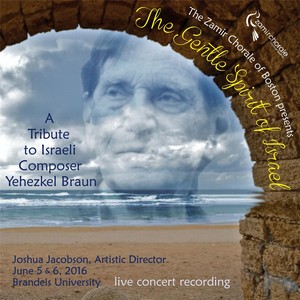
The Gentle Spirit of Israel
- 流派:World Music 世界音乐
- 语种:英语
- 发行时间:2016-06-30
- 类型:演唱会
- 歌曲
- 时长
简介
Yehezkel Braun was born in Breslau, Germany in 1922, and was brought to the land of Israel with his parents when he was two years old. Braun recalled that his earliest musical memories were on the one hand the recordings of Italian opera that his father would often play, notably Madame Butterfly and La Bohème, and on the other hand the indigenous singing of Yemenite women who would pass by his home on their way to work. Braun studied composition with Alexander Boscovic, who believed that composers should strive to cultivate an “Israeli” style by consciously incorporating rhythms and melodic motifs borrowed from traditional Jewish chant. Braun was certainly attracted to traditional Jewish melodies; he collected them and used many of them in his compositions. But he also was attracted to Gregorian Chant, in which he immersed himself with several sojourns to the Solemnes Monastery. He studied music at the Tel Aviv Academy, from which he graduated in 1953, and then returned to academia two decades later to study for a bachelor’s degree in Classics at Tel Aviv University. One can hear all these influences in Braun’s music. Braun’s love of vocal melodies is certainly appreciated by anyone who sings his music. Many years ago Braun told me that he doesn’t compose harmonically, rather he composes “horizontally,” conceiving of each voice part as its own melody. And as Jehoash Hirshberg pointed out in a recent article, Braun never thought about composing while he was composing. Braun wrote, “I gave up on two things: on thinking about music and on thinking what to think and how to think, to compose while thinking. It used to cause me torment and terrible emotional pain. One day I said to myself: the hell with all that, I will write what I hear. … Music is something that either happens or does not.” And for Yehezkel Braun, music certainly did happen. In his 92 years he produced an enormous output of works for orchestra, chamber ensembles, solo piano, chorus and solo voice. In his vocal works, the music flows from the text, expressing it but never overpowering it. His adherence to principles of classical form makes his music readily understood and appreciated by all audiences. And his use of melodies and styles extracted from folklore give much of his music a sense of groundedness. But above all else, Yehezkel Braun’s music reflects the personality of Yehezkel Braun, noble yet humble, gentle but principled, generous and loving. May his memory—and his music—be a blessing. In 1982 Yehezkel Braun was a visiting faculty at Brandeis University. On March 28 of that year the Zamir Chorale of Boston participated in a concert of Braun’s music at Brandeis’s Slosberg Recital Hall. Tonight Zamir returns to Brandeis to perform a tribute concert in memory of this great composer. The program reprises three works that were presented at the 1982 concert, Song of Songs Chapter Three, Songs of the Dove and the Lily, and Festive Horns. In addition, we are performing the American premiere of Hem Ameru (from Mishnah Pirkey Avot, composed for Zamir’s 36th anniversary), Halleluyah (from the Hallel Service), Vayimalet Kayin (originally composed for the popular Yarkon Bridge Trio), and Braun’s arrangement of four popular Israeli songs, Shibbolet Ba-Sadeh, Uri Tsafon, Ronu Na, and Yerushalayim Shel Zahav. We reproduce below the notes that Braun wrote for the 1982 program: Shir Hashirim III (Cantici Canticorum Caput III) This work is a setting, for mixed choir a cappella, of the third chapter of Song of Songs. The melodic idiom is inspired by, but not based upon, biblical cantillation. I envisaged a sort of musical texture and style that would bring out the words as clearly as possible, as they would be pronounced in spirited, rhythmical, speech. Moreover, I had in mind the double nature of this unique poetry: as a collection of charmingly innocent love and wedding songs of an ancient people and as the greatest and most profound expression of the special bond between the people of Israel and the Holy Presence. Songs of the Dove and the Lily This is a setting for voice and piano of a cycle of four poems by Leah Goldberg. The poems are about tender love, cruelly frustrated. The dramatic climax is reached in the third song. The last song is an echo of the first, but, emerging from the depths of despair, the dove, symbol of hope, reappears. Festive Horns This work for choir and brass octet is a setting of six passages from the Mishnaic tractate “Rosh Hashanah”, dealing with rules and customs of blowing the shofars and trumpets on the High Holidays and on other occasions. The choir presents the Mishnaic text while the brass instruments, evoking in a stylized manner the memory of the ancient ritual horns and trumpets, weave a musical commentary around the text chanted by the choir, much in the manner of later Rabbinical commentaries that used to be set around the Mishnaic text. –Y. B.







